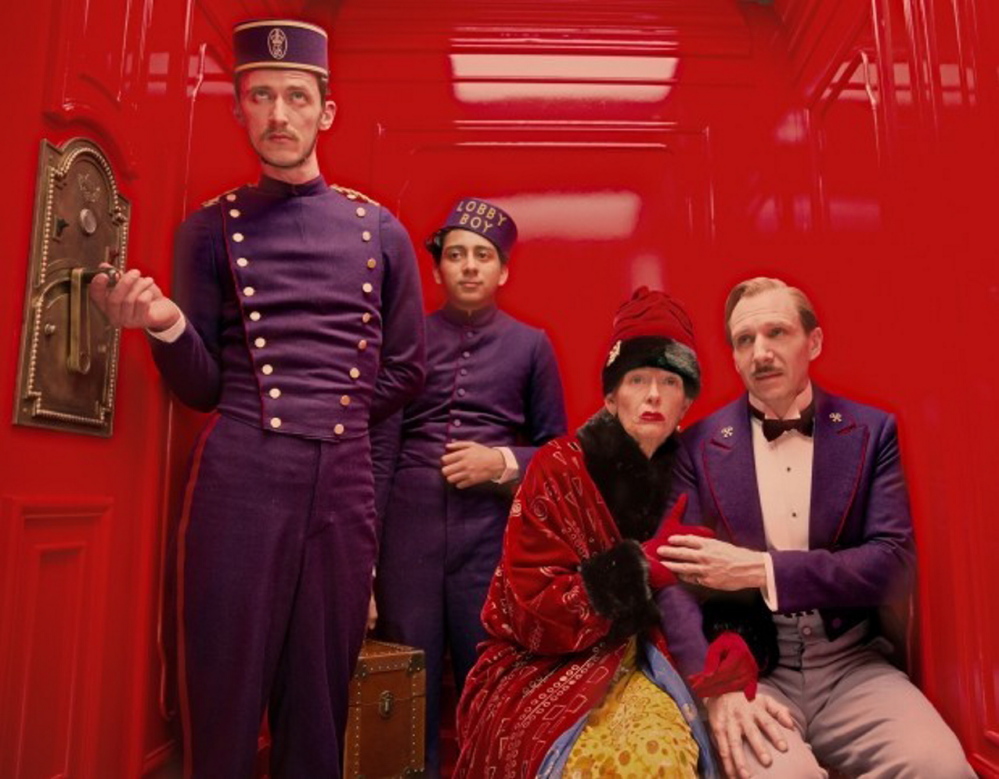“The Grand Budapest Hotel” is writer-director Wes Anderson’s first full-on action picture, replete with gunfights, high-speed chases, great escapes and cliffhangers. Because it’s made by Anderson, though, the movie still pays meticulous care to stacks of bow-tied pink boxes of macaroons, the impossibly deep purple-blue of a concierge’s jacket and rat-tat-tat dialogue that flies so fast it that you often need a couple of seconds to catch up with the jokes.
Detractors of Anderson (“Moonrise Kingdom,” “The Royal Tenenbaums,” “Fantastic Mr. Fox”) – and they are legion – will once again point to the fussiness of the director’s attention to meaningless details and colors, to his emphasis on perfectly balanced framing and his precise, sumptuous set design, all things that in the past have sometimes distracted from the main show.
Not this time, though. The plot of “The Grand Budapest Hotel” is nestled into three separate time frames like a Russian doll: 1985, 1965 and 1932. But it’s the latter that interests Anderson the most, when the manager of the eponymous five-star hotel, M. Gustave (Ralph Fiennes) and his lobby boy (Tony Revolori), embark on a series of adventures in the fictitious Republic of Zubrowka.
These involve a wealthy 88-year-old (Tilda Swinton, sporting a gray mountain of Marge Simpson hair), her greedy relatives and family (including Adrien Brody and a menacing Willem Dafoe) and an invading army that is never identified as Nazis but sports an emblem that could pass for a redesigned swastika (the spurts of violence that pop up during the film, sometimes to startling effect, let you know Anderson is not taking this subject matter lightly).
Fiennes, whose talents have been largely forgotten during the decade he spent playing the noseless Voldemort in the Harry Potter movies, has great fun as the suave ladies’ man and perfectionist who expects nothing but greatness from his charges and knows how to charm a farmer out of his most prized mule.
The unquestionable lead of this large cast of Anderson stock players, Fiennes hasn’t been this animated and energized since, well, never. There’s great comedy in watching Gustave switch between his various personas, always depending on whom he’s talking to, sometimes at a hairpin turn.
He’s equally resourceful cozying up to hardened criminals (including Harvey Keitel) as he is wooing aging matriarchs who melt at his every compliment. He’s the engine that keeps this elaborate contraption chugging, and The Grand Budapest Hotel proves the actor should try his hand at comedies more often.
But the true star of movie is its director, who uses every conceivable filmmaking trick (including, at one point, some fantastic animation) to make you feel like you’re turning the pages of the greatest pop-up book ever written.
“The Grand Budapest Hotel” careens from one situation to the next, culminating in a frantic half-hour that feels like a highlight reel from Anderson’s career. Perhaps in response to a piece in The New Yorker that claimed he took pleasure killing dogs in his movies (“Moonrise Kingdom,” “The Royal Tenenbaums,” “The Life Aquatic with Steve Zissou” and “Fantastic Mr. Fox” all featured canine deaths), Anderson kills a cat this time, but in a manner so sudden and slapstick that only the most humorless animal lovers won’t laugh.
That goes for the rest of the movie, which dares to confront troubling patches of European history head-on but with a lightness of touch and a frivolous energy so intoxicating, the ugly reality lurking at the edges of the screen never spoils the considerable fun.
The movie is a flume ride through the imagination of one of the most creative minds making movies today, and the pleasure curls your toes. Also, be ready to crave some macaroons.
Copy the Story LinkSend questions/comments to the editors.



Success. Please wait for the page to reload. If the page does not reload within 5 seconds, please refresh the page.
Enter your email and password to access comments.
Hi, to comment on stories you must . This profile is in addition to your subscription and website login.
Already have a commenting profile? .
Invalid username/password.
Please check your email to confirm and complete your registration.
Only subscribers are eligible to post comments. Please subscribe or login first for digital access. Here’s why.
Use the form below to reset your password. When you've submitted your account email, we will send an email with a reset code.